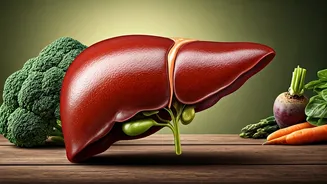Fatty Liver Unveiled
Fatty liver disease, characterized by excess fat accumulation in the liver, presents a significant health challenge. It can result from diverse factors,
from unhealthy eating habits to excessive alcohol consumption. The condition often begins subtly, with symptoms that might be overlooked, making early detection and intervention crucial. A deeper understanding of the disease's impact is the first step in effective management. It's vital to recognize the warning signs to prevent progression to more severe stages, such as cirrhosis. Furthermore, identifying and addressing the underlying causes through lifestyle modifications and dietary adjustments is imperative to minimize liver damage and maintain overall health. By understanding the mechanisms behind fatty liver disease, individuals can proactively support liver function and improve their well-being. The goal is to educate and provide clarity, empowering individuals to take control of their liver health.
Uncommon Symptoms Uncovered
Beyond the commonly known symptoms, fatty liver can manifest through less apparent signs. These can include fatigue or persistent malaise, a generalized feeling of unwellness. Joint pain and stiffness, similar to arthritis, can also occur. Nausea or digestive discomfort is another less-obvious symptom, disrupting daily routines. Recognizing these less frequent indications is critical for early detection. Additionally, these symptoms can overlap with other conditions, making diagnosis challenging. Therefore, healthcare professionals must conduct thorough evaluations to ascertain the underlying cause. Considering these less-known symptoms highlights the importance of a comprehensive approach to liver health. Awareness of these various presentations helps individuals seek medical attention promptly and manage the condition effectively, improving the overall quality of life.
Vegetables for Liver Health
Incorporating specific vegetables into the diet can provide significant support for liver function. Among these, green leafy vegetables such as spinach and kale are rich in antioxidants and essential nutrients, reducing inflammation. Broccoli and cauliflower contain compounds that aid in detoxification processes, helping the liver eliminate harmful substances. Garlic, a potent ingredient, boosts the liver's ability to detoxify and can improve liver health. Additionally, beets are beneficial, assisting in liver detoxification. Including these five vegetables in your daily meals can provide vital support. These vegetables offer valuable nutrients that support the liver in its various functions. Regular consumption of these vegetables can help in minimizing liver damage and promoting the regeneration of liver cells. Incorporating these foods into your diet can be a simple yet effective way to help improve your liver's health.
Lifestyle Adjustments Essential
Besides dietary modifications, certain lifestyle changes are critical in addressing fatty liver disease. Regular physical activity is crucial as it enhances liver function and aids in weight management. Maintaining a healthy weight is a crucial factor. Avoiding or limiting alcohol consumption significantly reduces strain on the liver. Adequate hydration is equally important, supporting overall health and the liver's detoxification processes. Also, reducing exposure to toxins, from environmental pollutants to certain medications, minimizes liver burden. Engaging in these lifestyle practices contributes to holistic health. These modifications help reduce fat buildup and promote liver cell regeneration. Making these changes supports the health and function of the liver, leading to improved health.





















